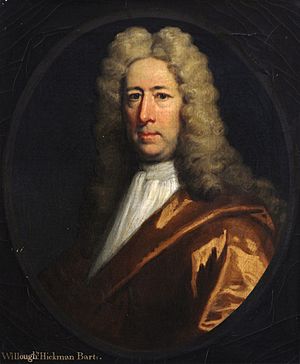Sir Willoughby Hickman, 3rd Baronet facts for kids
Sir Willoughby Hickman, 3rd Baronet (born 1659 – died 1720) was an important landowner and politician from Gainsborough Old Hall, England. He served as a Member of Parliament (MP) in the English House of Commons and later in the British House of Commons. This means he was a representative for his area, helping to make laws for the country.
Contents
Who Was Sir Willoughby Hickman?
Sir Willoughby Hickman was born on August 20, 1659. He was the third son of Sir William Hickman, 2nd Baronet, but he was the oldest son who lived to become an adult. His family lived in Gainsborough, Lincolnshire. When his father passed away in 1682, Willoughby inherited his father's lands and also became a Baronet. A Baronet is a special title, like a knight, that is passed down through the family. In 1683, he married Anne Anderson.
Sir Willoughby's Time in Politics
Sir Willoughby Hickman was involved in politics for many years.
Early Roles and First Election
- From 1682 to 1689, he was a Steward for Kirton manor in Lincolnshire. A steward managed the affairs of a large estate.
- He also served as a Deputy Lieutenant for Nottinghamshire and Lincolnshire starting in 1682. This role involved helping to keep order and manage local military matters.
- In 1685, he was elected as a Member of Parliament for Kingston upon Hull. He served in Parliament for two years.
- After a break, he became a Justice of the Peace (JP) for Nottinghamshire and Lincolnshire in 1698. A JP helps to enforce laws and keep the peace in their local area.
Challenges in East Retford
Sir Willoughby tried to become an MP again in 1698 for East Retford. He won this election without anyone running against him. However, after this, elections in East Retford became very difficult for him.
- In the first election of 1701, he lost the vote but was allowed to take his seat in Parliament after a special review called a "petition."
- In the second election of 1701, he lost again, and this time his petition was not successful.
- In 1702, he lost the vote but was again seated in Parliament after another petition.
- In 1705, he won the most votes, but he was removed from his seat after a petition.
Because of these repeated challenges, Sir Willoughby stopped trying to be an MP for East Retford. Instead, in 1710, his son Willoughby ran for the same seat and also faced similar problems, only getting into Parliament after a petition.
Representing Lincolnshire
Sir Willoughby Hickman later became an MP for Lincolnshire.
- In 1713, he was elected as an MP for Lincolnshire in a special election, and no one ran against him.
- He was re-elected for Lincolnshire in 1715, again without anyone running against him. He continued to serve as an MP until he passed away in 1720.
Family and Legacy
Sir Willoughby Hickman passed away on October 28, 1720. He and his wife, Anne, had many children: six daughters and five sons. Only two of their sons lived to adulthood. His son, Neville, took over the Baronetcy after him.
His daughter, Elizabeth, born in 1693, married Henry Eyre. Their daughter, Anne, later married Clotworthy Skeffington, 1st Earl of Massereene, who was a very important person.
Images for kids
 | Chris Smalls |
 | Fred Hampton |
 | Ralph Abernathy |



